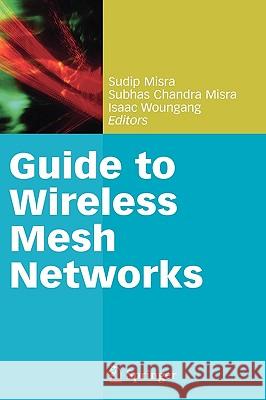Guide to Wireless Mesh Networks » książka
Guide to Wireless Mesh Networks
ISBN-13: 9781848009080 / Angielski / Twarda / 2008 / 528 str.
Overview and Goals Wireless communication technologies are undergoing rapid advancements. The last few years have experienced a steep growth in research in the area of wireless mesh networks (WMNs). The attractiveness of WMNs, in general, is attributed to their characteristics such as the ability to dynamically self-organize and self-con?gure, coupled with the ability to maintain mesh connectivity leading, in effect, to low set-up/installation costs, simpler maintenance tasks, and service coverage with high reliability and fault-tolerance. WMNs also support their integration with existing wireless networks such as cellular networks, WLANs, wireless-?delity (Wi-Fi), and worldwide interoperability of microwave access (WiMAX). WMNs have found u- ful applications in a broad range of domains such as broadband home networking, commercial/business networking, and community networking - particularly attr- tive in offering broadband wireless access with low initial installation and set-up costs. Even though WMNs have emerged to be attractive and they hold great promises for our future, there are several challenges that need to be addressed. Some of the wellknownchallenges areattributedtoissuesrelatingtoscalability(signi?cantdrop in throughput with the increase in the number of nodes), multicasting, offering qu- ity of service guarantees, energy ef?ciency, and security. This handbook attempts to provide a comprehensive guide on fundamental key topics coupled with new ideas and results in the areas of WMNs. The book has been prepared keeping in mind that it needs to prove itself to be a valuable resource dealing with both the important core and the specialized issues in WMNs.











